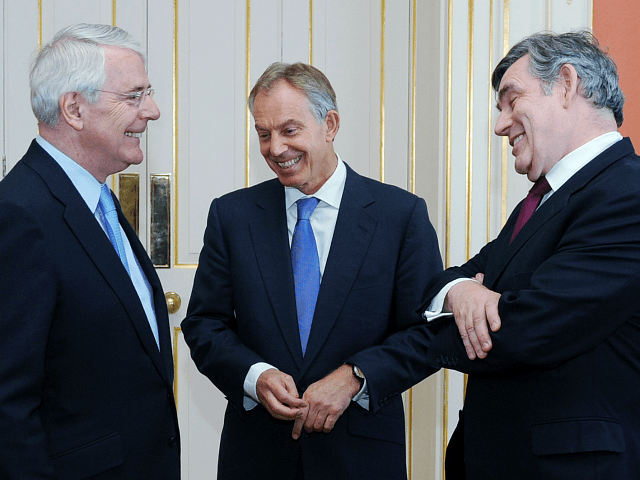Former Labour Prime Minister Gordon Brown has called for a delay to the UK leaving the EU of one year for another “public consultation” on Brexit, after the country had already voted to leave in 2016 and voted in the vast majority for parties in 2017’s general election that promised to deliver Brexit.
Former Prime Minister Brown told Sky News on Thursday that an extension to Article 50 for another year would “allow the country to be consulted in ‘citizens’ hearings'” and would “bring the country together.”
In other remarks reported by the Press Association, Mr Brown, who was also the long-serving Chancellor of the Exchequer under his predecessor and fellow fervid Europhile Tony Blair, said, “The logic of extending Article 50 is now inescapable to avoid chaos on March 29 and prevent an impending national political disaster.”
“It is now clear that Article 50 should be extended, perhaps for a year, not as a delaying tactic or just for MPs to rerun the old arguments in the Westminster bubble, but for a positive purpose – to allow Parliament to reflect – and to begin to bring the country together again,” he added.
Return of the Globalists: Blair, Major, Clegg, and Heseltine Fortify Campaign to Kill Brexit https://t.co/iKDTGrswBl
— Breitbart London (@BreitbartLondon) October 17, 2018
Mr Brown’s intervention is his latest after having made a similar call in January for a 12-month delay to ask the British public again on what it believes should be the UK’s future relationship with the ever-expanding, progressive Brussels bloc.
This is despite 52 per cent of the British electorate voting to leave the EU nearly three years ago, and returning to the polls in 2017 to vote by more than 80 per cent for parties that pledged to respect the referendum result and leave the EU.
His comments were supported by former Tory Prime Minister John Major, who was recently condemned by the Democratic Unionist Party for evoking the memories of IRA terrorism by implying that leaving the EU without a deal would result in the return of the Irish Troubles.
Writing in The Times on Friday, Mr Major said, “…whether or not the prime minister’s withdrawal deal is approved next week, Article 50 must be extended.”
“EU and government sources are presuming a short extension (if any) to Article 50. But I would argue for a longer period, perhaps a year, to enable a full public consultation and well-prepared exit,” he added.
Mr Blair also returned to the media this week to make pleas for Britons to overturn the Brexit vote and stay in “Europe,” telling voters, on LBC host James O’Brien’s podcast Full Disclosure, “I can’t make you listen and you can’t stop me speaking.”
Forcing voters to wait another year for Brexit in attempts to water down the result in so-called “public consultations” is reminiscent of Eurocrats pushing voters’ decisions aside if they happened to vote against ‘more Europe’ or asking voters to vote again if they did not give the ‘right’ answer the first time.
Establishment Launches Anti-Brexit Campaign ‘People’s Vote’ to Overturn… the People’s Vote https://t.co/rSs89WJD7r
— Breitbart London (@BreitbartLondon) April 15, 2018
On the Maastrict Treaty, Denmark voted ‘no’ in 1992 and was made to vote again. In 2001, Ireland voted ‘no’ to the Nice Treaty was made to vote again.
France and the Netherlands’ votes against the EU Constitution in 2005 were ignored, with then-Prime Minister of Luxembourg and current president of the European Commission Jean-Claude Juncker saying, “the French and Dutch did not really vote ‘no’ to the European Constitution.”
Juncker made the comments after saying ahead of the French vote, “If it’s a Yes, we will say ‘on we go’, and if it’s a No we will say ‘we continue’.”
The European Constitution was then rebranded as the Lisbon Treaty and ratified. Ireland voted against the Lisbon Treaty in 2008, but was, unsurprisingly, asked to vote again.

COMMENTS
Please let us know if you're having issues with commenting.